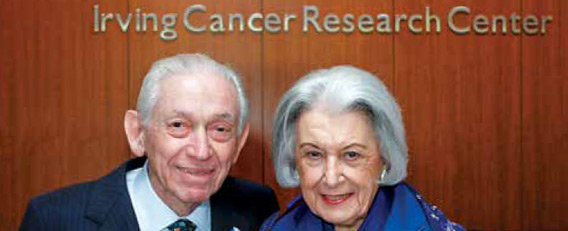Bequest Sets Stage for Support for Cancer
Columbia University and NewYork-Presbyterian announced in November that Florence Irving and her late husband, Herbert Irving, have given $700 million to the two institutions to advance cancer research and treatment.
In a joint statement issued by Columbia President Lee C. Bollinger, VP&S Dean Lee Goldman, and NYP CEO Steven J. Corwin, the leaders underscored the significance of the largest gift in the medical center’s history: “What is perhaps less well understood is that the dramatic advances now within our reach will be realized only by harnessing the learning of many different scientific disciplines and such work requires enormous institutional resources. The Irvings have given us the means to engage in that collective effort, and we are determined to reward their ambitious vision.”
The $700 million bequest, which includes $600 million in new funds, brings the Irvings’ total donations to Columbia University and NewYork-Presbyterian to more than $900 million over the past three decades. The medical center campus shared by the two institutions was renamed in 2016 to honor the Irvings; the institutions are now known as Columbia University Irving Medical Center and NewYork-Presbyterian/Columbia University Irving Medical Center.
The Irvings’ historic gift will have a profound impact on research and clinical care at what is already one of the world’s preeminent academic medical centers at a time when new scientific tools and techniques are allowing researchers and clinicians to better understand how cancer begins and grows—and how to fight its spread. The new resources will help Columbia and NewYork-
Presbyterian recruit the best basic scientists, physician-scientists, and clinicians dedicated to producing a range of innovations in patient care, including improved efficacy of radiation therapy, new surgical approaches, and the development of a variety of new therapeutic options for patients. Facilities also will be expanded at the Herbert Irving Comprehensive Cancer Center, one of 47 cancer centers designated as comprehensive centers in the United States and one of the first to be designated by the National Cancer Institute for its capabilities in both cancer research and clinical care. More than 4,000 new cancer patients are treated at Columbia each year.
The Irvings’ philanthropy will be felt across a wide range of scientific disciplines, including cancer genomics, immunology, computational biology, pathology, and biomedical engineering. A key focus will be to further advance cancer research and clinical care in Columbia’s Precision Medicine Initiative, which, in partnership with NewYork-Presbyterian, explores the genetic and genomic basis of cancer and other life-altering diseases.
The Irving name has long been associated with Columbia and the Columbia campus of NewYork-Presbyterian. The medical center is home to the Herbert Irving Pavilion, the Irving Cancer Research Center, the Irving Institute for Clinical and Translational Research, the Irving Radiation Oncology Center, the Irving Bone Marrow Transplant Unit, and the Herbert Irving Comprehensive Cancer Center. The Irvings also have long supported Columbia’s work through named professorships, faculty chairs, and clinical and research facilities. Their giving to Columbia began with their 1987 endowment of the Irving Scholars program for early-career clinical investigators.
Florence and Herbert Irving were born and raised in Brooklyn. Herbert Irving, who died in 2016 at the age of 98, was a co-founder and former vice chairman of Sysco Corporation, the nation’s largest food distributor. Florence Irving has served in leadership positions on the boards of several non-profit institutions.
“Herbert and I have always been proud to help the terrific doctors at Columbia and NewYork-Presbyterian,” said Florence Irving. “It meant everything to him to be able to support world-class research and caregiving that makes a difference in people’s lives. I am honored, as he always was, to be associated with these great institutions and the special people who make them what they are.”
- Log in to post comments


